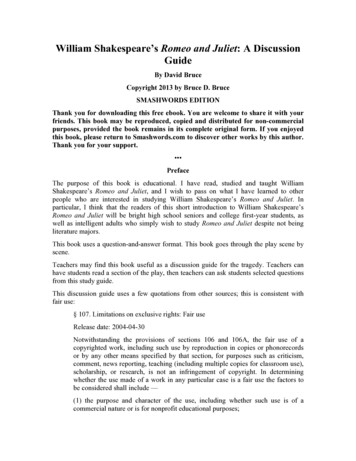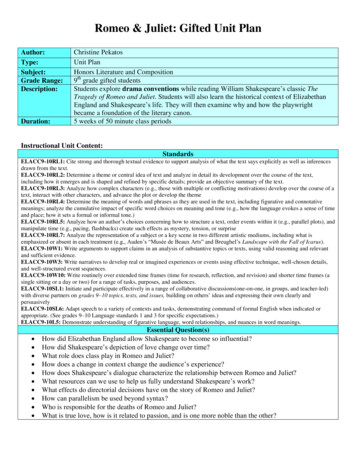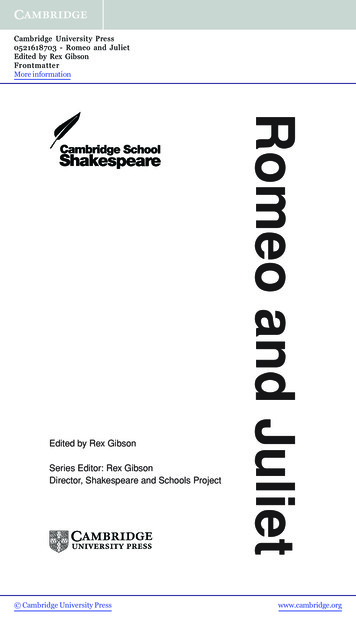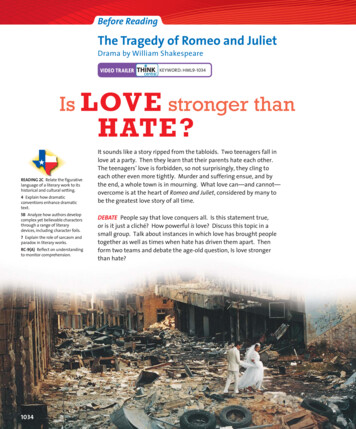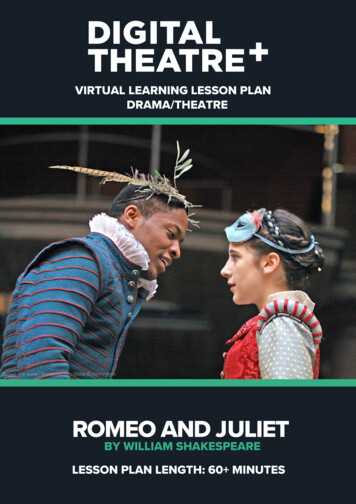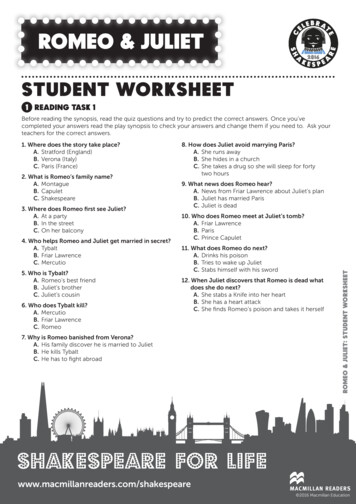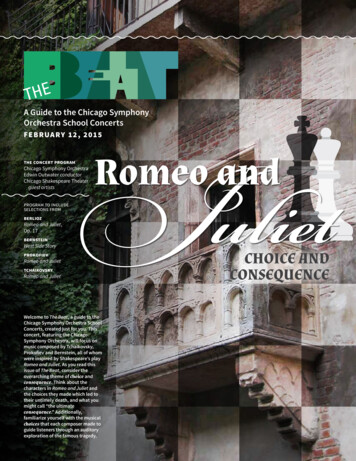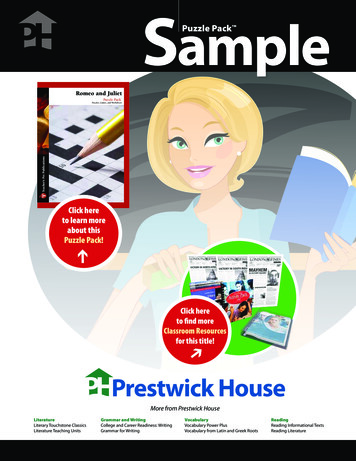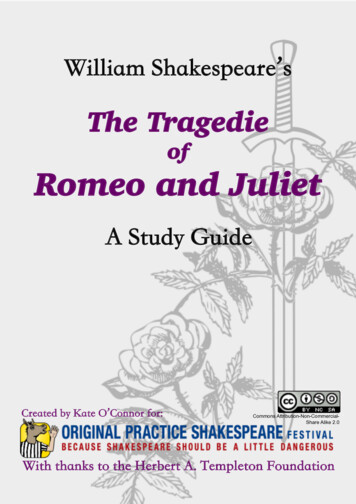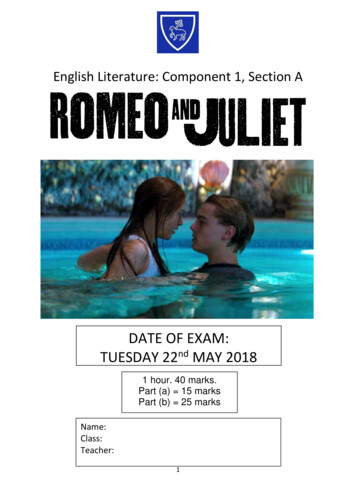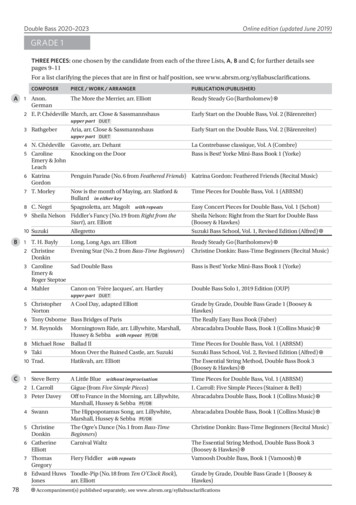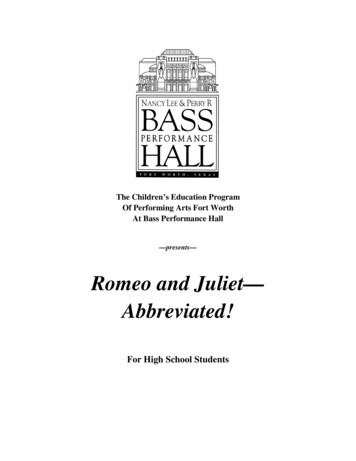
Transcription
The Children’s Education ProgramOf Performing Arts Fort WorthAt Bass Performance Hall—presents—Romeo and Juliet—Abbreviated!For High School Students
Dear Teachers,We are proud to present an updated, shortened version of Romeo and Juliet, produced by StageWest Theater of Fort Worth. We were interested in presenting the play in a form that studentscould relate to and in which they might see relevance. We hope that it will make studying theplay in the classroom more interesting and enjoyable.We were happy that Dana Schultes at Stage West embraced this concept immediately and sheand her company have done a great deal of work to make this play modern, while staying true toShakespeare’s model. We thank her and her group for their vision.There are several TEKS standards which this play addresses. Choose those that are applicableto your classroom-110.31 English Language Arts and Reading(4) Reading/Comprehension of Literary Text/Drama. Students understand, make inferences and drawconclusions about the structure and elements of drama and provide evidence from text to support theirunderstanding. Students are expected to explain how dramatic conventions (e.g., monologues, soliloquies,dramatic irony) enhance dramatic text.(12) Reading/Media Literacy. Students use comprehension skills to analyze how words, images, graphics,and sounds work together in various forms to impact meaning. Students will continue to apply earlierstandards with greater depth in increasingly more complex texts. Students are expected to:(B) analyze how messages in media are conveyed through visual and sound techniques (e.g., editing,reaction shots, sequencing, background music);Please let me know if you have questions or problems. Otherwise, we will see you and yourstudents at Bass Performance Hall soon.Sue BurattoDirector of EducationBass Performance Hallsburatto@basshall.com817.212.4302
William ShakespeareWilliam Shakespeare 1564-1616Known Facts: William Shakespeare was born in Stratford-upon-Avon on or near April 23,1564. Church records from Holy Trinity Church indicate that he was baptized there onApril 26, 1564. William’s parents were John Shakespeare, leather merchant and successfulbusinessman, and Mary Arden. In 1556 John bought a large house where William wasborn. He was an alderman member of the town council and in 1568 appointed HighBailiff, the equivalent of Mayor of Stratford. However when he lost his fortune a few yearslater, William had to leave school to work. In 1582 William married Anne Hathaway.Stratford-upon-AvonAnne Hathaway1
William was 18 at the time and Anne was 26—and pregnant. Their first daughter, Susanna,was born on May 26, 1583. The couple later had twins, Hamnet and Judith, born February2, 1585 and christened at Holy Trinity Church. Hamnet died in childhood at the age of11, on August 11, 1596.For seven years William Shakespeare pretty much disappeared from all records, turningup in London around 1592. By 1594 he was not only acting and writing for the theatergroup, Lord Chamberlain’s Men (called the King’s Men after the ascension of James I in1603), but was a managing partner in the operation as well. The first recordedperformance of Romeo and Juliet was in 1595. With Will Kempe, a master comedian,and Richard Burbage, a leading tragic actor of the day, the Lord Chamberlain’s Menbecame a favorite London troupe, patronized by royalty and made popular by the theatergoing public. When plague forced theater closings in the mid-1590s, Shakespeare and hiscompany made plans for The Globe Theater on the South Bank across the Thames Riverfrom London. While Shakespeare could not be counted as wealthy, by London standardshis success allowed him to purchase NewHouse in Stratford and retire there in1611 as a prosperous country gentleman.Modern re-creation of Globe TheaterWhen Shakespeare lived in London inthe late 1500s, England was a rich andpowerful nation under the leadership ofQueen Elizabeth I, although the countrywas divided by religious strife. TheChurch of England and Catholics werein constant battle for supremacy.Theater was thriving and Shakespeare wassuccessful as an actor, poet and playwright. He wrote 37 plays and over 150 sonnets. Hewrote more than 100,000 lines of text and devised more than 1,200 characters. He used30,000 different words in his works, showing he had one of the richest vocabularies of anywriter in English. He turned nouns into verbs, linked adjectives together to form new wordsand borrowed words from other languages.In writing his plays, he would often use a plot he already knew or had read about, convertit, add to it and make it his own. Seven years after his death, his friends John Hemingeand Henry Condell published a book containing 36 of Shakespeare’s plays, called the“First Folio.” His work covered many subjects and styles, including comedies, tragedies,romances and historical plays. Shakespeare was a well-loved writer in his lifetime; andnow, 400 years later, he is the most produced playwright in the world.William Shakespeare wrote his will in 1611, bequeathing his properties to daughter,Susanna. To his other surviving daughter Judith, he left 300, and to his wife Anne heleft “my second best bed.” This bed is one of the mysteries of Shakespeareanscholarship. William Shakespeare allegedly died on his birthday, April 23, 1616. This is2
probably more of a romantic myth than reality, but Shakespeare was buried at HolyTrinity Church in Stratford on April 25, 1616.Trinity Church where Shakespeare was baptized and buriedFrom“Shakespeare for Teachers”The Acting CompanyAndShakespeare’s England3
The Characters in Romeo and JulietEscalusPrince of VeronaMercutiothe Prince’s kinsman and Romeo’s friend. He is lively and talkative andrepresents youth and freedom in the play. He is loyal to his friend, Romeo. He isbrave: he comes to the defense of Romeo when Tybalt insults him. When he laysdying from the wound by Tybalt, he pretends it is just a scratch. He playsimportant roles in the plot: he convinces Romeo to attend the Capulet party wherehe first meets Juliet and when Mercutio is killed, it sets off the tragic chain ofevents—Tybalt murders Mercutio, Romeo is enraged and kills Tybalt, he isbanished from Verona, and because Romeo and Juliet cannot communicate, thereis confusion and they ultimately die.Parisa young count. He is a handsome, pleasant young man and cousin of thePrince. He seems to truly care for Juliet and mourns when she dies.Montague and His WifeRomeoson of the Montagues. Romeo is impetuous and impulsive: the moment hehears of Juliet’s death, he leaves for Verona. He buys poison to kill himself beforehe knows any details. He is a good man, who did not want to kill Tybalt. He is agenerous and kind friend. When he kills Paris, he is very sad. Falling in love withJuliet helps him grow up. At the end of the play he thinks only of Juliet and killshimself to be reunited with Juliet.BenvolioMontague’s nephew and Romeo’s friendCapulet and his Wife the stubborn, short-tempered parents of Juliet. They wantwhat is best for Juliet but they are not very close to her and keep the feudalive through their manipulations.Julietdaughter of the Capulets. Juliet is not yet 14. She is gentle and obedient to herparents, who are of noble birth. She is fond of her Nurse, who has raised her. Sheis stronger than most women of the Renaissance; she defies her parents’ decisionof who she will marry. Her first thoughts are for Romeo and he is the mostimportant thing in her life. After Romeo is banished from Verona, she does not4
beg him to stay, knowing that will endanger him. She prefers to die rather than tolive without him.Nursethe down-to-earth, simple servant of Juliet.Tybaltnephew of Capulet’s Wife. He is a troublemaker who loves to fight and likesviolence for violence’s sake. He is probably the person who keeps the feud betweenthe Montagues and the Capulets alive.Friar Laurence a Franciscan priest. He is a wise and holy man; both Romeo andJuliet turn to him for advice. Many people say that he should not have marriedthe young couple in secret, deceiving the parents. In the end he suffers for his partin the death of the young couple.5
THE PLOTIn Verona there are two prominent families who are constantly at war: the Capulets and theMontagues. The play opens with a fight erupting between members of each rival family beforethe Prince arrives and breaks up the fight. He proclaims that the next person to cause adisturbance will pay with his life.Romeo, a Montague, is sad because he was unable to woo a woman named Rosaline.Meanwhile, Juliet, who is a Capulet, has been told she is to be married to Count Paris, althoughshe is not in love with him. She is also told she must prepare for a huge party that her parents aregiving that night. In order to cheer him up, Romeo’s best friend, Mercutio suggests they crashthe Capulet party. Reluctantly, Romeo agrees to go to the party.At the party, Romeo and Juliet see each other for the first time and it is love at first sight. Theydon’t realize they are from the two feuding families. Even once they are told they each belong totheir family’s enemy, there is nothing that can be done to keep them apart. After the party ends,Romeo finds Juliet’s balcony off her bedroom and calls to her. They share ardent vows of love(the famous “balcony scene”) and plan their future.The two star-crossed lovers seek help from their friends. Juliet asks her trusted Nurse for help;Romeo turns to Friar Laurence. These two helpers act as go-betweens to devise a plan. The nextday they are married.While all this is happening, Mercutio and some other Montagues again fight with Tybalt (Juliet’scousin) and other Capulets. Romeo happens upon the scene and desperately tries to break up thefight but fails, and Tybalt stabs and kills Mercutio (who wishes a “plague o’ both your houses”).Enraged by the death of his best friend, Romeo chases and kills Tybalt. Romeo flees before thePrince appears. When the Prince arrives, he decides that Romeo should be exiled and may neverreturn to Verona.The Nurse, though distraught over the death of Tybalt, sends word to Romeo through FriarLaurence that he is to meet Juliet that night in her bedroom. After Romeo leaves Juliet, her fathertells her that she is to be married to Count Paris on Monday, much sooner than originallyannounced. With Romeo banished from Verona, there seems to be little that can be done tobring Romeo and Juliet together.When a distraught Juliet visits Friar Laurence, he gives her a special potion. The potion will putJuliet into such a deep sleep that she will appear to have died. Once she is entombed, themarriage to Paris will be called off, Juliet will awake, Romeo will find her and they will livehappily ever after. Friar Laurence is to send word to Romeo about Juliet’s plan and fake death.6
However, because of a plague, all the gates of Mantua are closed, the messenger never getsthrough and Romeo never hears about her faked death. Instead, Romeo only hears rumors thatJuliet has died. On his way back to Verona, Romeo visits an apothecary to buy poison andproceeds to the Capulet family tomb. As he enters the tomb, he sees Paris. The two men fightand Paris is killed.Romeo finds Juliet, who is still asleep, and thinking she is dead, drinks the poison and dies nextto her. When Juliet awakes from her slumber and finds Romeo’s body next to her, she ishorrified. With no poison left to drink, Juliet takes Romeo’s dagger and stabs herself.When the Prince, the Capulets, Friar Laurence and Lord Montague enter the tomb, they findRomeo and Juliet both dead. In the end, Mercutio, Tybalt, Paris, Romeo and Juliet are all deadbecause of the feud between the two families. The Montagues and Capulets reconcile, realizingthat the feud has caused so much death and destruction.As the Prince says, “For never was a story of more woe, Than this of Juliet and her Romeo.”7
TextThere are many lines in Romeo and Juliet which you may have heard before, even thoughyou had not read the play. They may be famous because they capture an idea so succinctly.A pair of star-crossed loversLove is a smoke rais’d with the fume of sighs;Being purg’d, a fire sparkling in lovers’ eyes;Being vex’d, a sea raging with lovers’ tears’What is it else? A madness most discreet,A choking gall and a preserving sweet.O, she doth teach the torches to burn bright!It seems she hangs upon the cheek of nightAs a rich jewel in an Ethiop’s ear My only love sprung from my only hate!Too early seen unknown, and known too late!PrologueAct I, Sc 1Act I, Sc 5ChorusRomeo on the nature of loveRomeo on first seeing JulietAct I, Sc 5 Juliet describing love for RomeoBut soft! What light through yonder window breaks?It is the east, and Juliet is the sun.Arise, fair sun, and kill the envious moon,Who is already sick and pale with griefThat thou her maid art far more fair than she. her eyes in heavenWould through the airy region stream so brightThat birds would sing and think it were not night.Act II, Sc 2 Romeo on seeing Juliet on balconyO Romeo, Romeo! Wherefore art thou Romeo? O, be some other name!What’s in a name? That which we call a roseBy any other name would smell as sweet,Act II, Sc 2 Juliet on Romeo’s nameLady, by yonder blessed moon I swear,That tips with silver all these fruit-tree tops--Act II, Sc 2 Romeo swears his loveO, swear not by the moon, th’inconstant moon,That monthly changes in her circled orb,Let that thy love prove likewise variable.Act II, Sc2 Juliet’s response8
My bounty is as boundless as the sea,My love as deep, the more I give to thee,The more I have, for both are infinite.Act II, Sc 2 Juliet declares her loveHow silver-sweet sound lovers’ tongues by night,Like softest music to attending ears.Act II, Sc 2 RomeoGood-night, good-night! Parting is such sweet sorrowThat I shall say good-night till it be morrow.Act II, Sc 2 Juliet says goodbyeFor this alliance may so happy prove,To turn your households’ rancor to pure love.Act II, Sc 3 Friar LaurenceThese violent delights have violent ends,And in their triumph die; like fire and powderWhich as they kiss consume.Therefore, love moderately; long love doth so;Act II, Sc 6 Friar’s warningCome, gentle night, come, loving, black-brow’d night,Give me my Romeo, and, when he shall die,Take him and cut him out in little stars,And he will make the face of heaven so fine,That all the world will be in love with night.Act II, Sc2 Juliet longs for nightA plague o’ both your houses!Act III Sc 1 MercutioJuliet: Wilt thou be gone? It is not yet near day;It was the nightingale, and not the lark,That pierc’d the fearful hollow of thine ear;Nightly she sings on you pomegranate-tree;Believe me, love, it was the nightingale.Romeo: It was the lark, the herald of the morn,No nightingale: look, love, what envious streaksDo lace the severing clouds in yonder east:Night’s candles are burnt out, and jocund dayStands tiptoe on the misty mountain tops:Act III, sc 5At break of dayRomeo: Farewell, farewell! One kiss, and I’ll descend.Juliet: Art thou gone so? My lord, my love, my friend!I must hear from thee every day in the hour,For in a minute there are many days:O! by this count I shall be much in years9
Ere I again behold my Romeo.Act III, Sc 5 Romeo and Juliet’s farewellMore light and light, more dark and dark our woes.Act III, Sc 5 RomeoHer blood is settled, and her joints are stiff;Life and these lips have long been separated.Death lies on her like an untimely frostUpon the sweetest flower of all the field.Act IV, Sc 5 Juliet’s death Ah, dear Juliet,Why art thou yet so fair? Shall I believeThat unsubstantial death is amorous,And that the lean abhorred monster keepsThee here in dark to be his paramour?Act V, Sc 3 Romeo gazes on Juliet Eyes, look your last!Arms, take your last embrace! And lips, O youThe doors of breath, seal with a righteous kiss O true apothecary,Thy drugs are quick. Thus with a kiss I die.Oh happy dagger,This is thy sheath: there rust, and let me die.Act V, Sc 3 Romeo’s last kissAct V, Sc 3 Juliet Capulet! Montague!See, what a scourge is laid upon your hate,That heaven finds means to kill your joys with love,And I, for winking at your discords too,Have lost a brace of kinsmen: all are punish’d.Act V, Sc3 Prince blames deaths on feudA glooming peace this morning with it brings.The sun, for sorrow, will not show his head.Go hence, to have more talk of these sad things;Some shall be pardon’d and some punished:For never was a story of more woeThan this of Juliet and her Romeo.Act V, Sc 3 The story of Romeo and Juliet10
Elizabethan TheaterNote that there is no roof over the middle of the theater and a thatched roofover balconies on the sides. It was referred to as the “Wooden O.” The theaterbuilding was open air.The apron stage was thrust in to the middle of the yard and was covered with aceiling, painted with sun, moon and stars.At the base of the stage was an area called the pit, where people could standfor a penny to watch the play; today those are among the most expensive seatsin a theater. The balconies rose three stories high, where the more expensiveseats were located.Performances started at 2:00 P.M. to make the most of daylight, sincethere were no electric lights.11
The stage was usually bare. Special effects and scenery did not play a big partin theater. Musicians provided sound effects and actors wore showy costumes.Audience members were expected to use their imaginations to supply the rest.Elizabethan theaters held 1500-3000 people who were often rowdy.Theaters were built outside the walls of the city to avoid control by cityauthorities, who claimed that plays had a bad effect on people’s morals.Women did not act on stage until after 1660. Before that time, boys playedwomen’s roles.When Shakespeare moved to London, he met with actor/manager RichardBurbage and became a prompter, then an actor, and later he became Burbage’sstar writer.Richard and Cuthbart Burbage opened “The Globe Theater” in 1599.Shakespeare produced most of his plays in The Globe and eventually becamepart owner.Queen Elizabeth (1558-1603) loved theater. In 1603 James I became king andalso supported theater.12
Shakespeare’s LanguageShakespeare’s language made him one of the most important writers in the world. He couldexpress powerful emotions and reveal his characters with unique phrases that are still used today.Writers often use literary devices such as figures of speech to express complex ideas or describesomething in a memorable way. Shakespeare was a master of imagery, using metaphors andsimiles.A simile is a comparison of one thing with another, using the words “like” and “as.”‘It seems she hangs on the cheek of nightLike a rich jewel in an Ethiop’s ear.’A metaphor describes something as if it were something else.‘But soft! What light through yonder breaks?It is the east, and Juliet is the sun.’Alliteration repeats the same sound at the beginning of words that are close to eachother to emphasize them.‘Gallop apace, you fiery-footed steeds,Toward Phoebus' lodging; such a waggonerAs Phaeton would whip you to the west.’Hyperbole means exaggerating.Romeo says that ‘[t]he brightness of [Juliet's] cheek would shame those stars,As daylight doth a lamp; her eyes in heavenWould through the airy region stream so brightThat birds would sing and think it were not night’Assonance is the repeated use of the same vowel sound in words that are close together.‘Is crimson in thy lips and in thy cheeks’Allusion is a brief reference to some person, place or thing in history, in other literature,or in actuality. In this play he makes references to Greek and Roman mythology,referring to the goddess of the hunt Diana and the god Cupid.PunsObjective: Students will explore the use of puns as a literary device. Students will learn about the Elizabethan fondness for wordplay.Fact:13
In the time of Queen Elizabeth I, verbal eloquence was honored above all other accomplishments.The Elizabethans were amused and fascinated by language and puns. They also loved insults.A pun is a play on words based on the similarity of sound between two different words withdifferent meanings. Look to Mercutio’s speech, especially, for a source of puns.Give me a torch. I am not for this ambling./Being but heavy(sad, weighing much) I will bear thelight (brightness, weighing little). (I,iv,1-2)Not I, believe me You have dancing shoes /With nimble soles. I have a soul of lead/So stakes meto the ground I cannot move. (I,iv,4-6).What dost thou make us minstrels? An thou makes mistrels of us, look to hear nothing butdiscords (off-key notes/disagreements). (III, i, 34-35)We see the ground (earth/reason) whereon these woes do lie,/But the true ground of all thesepiteous woes/We cannot without circumstance descry. (V,iii,179-181).ask for me to-morrow, and you shall find me a grave man. [Grave meaning "serious", but inthis case, dead.] (III, i, 65)Paradox and OxymoronObjective: Students will identify and trace the themes of love and hate in the playStudents will explore the use of paradox and oxymoron as literary devicesStudents will do a close reading of Romeo’s speechRomeo:O me! What fray was here?Here’s much to do with hate, but more with love:Why then, o brawling love, O loving hate.O any thing of nothing first create!O heavy lightness, serious vanity,Feather of lead, bright smoke, cold fire, sick health,Still waking sleep, that is not what it is!This love feel I, that feel no love in this. (I, i,106ff)A paradox is a statement or situation containing apparently contradictory or incompatibleelements, a figure of speech in which an apparently self-contradictory statement is neverthelessfound to be true.An oxymoron is a literary device employing paradox, a seeming contradiction reduced to twowords, usually an adjective-noun (“plastic silverware”) or adverb-adjective (“breathtakinglydull”). It is used for effect, complexity, emphasis or wit. Oxymorons are used when things have14
gone contrary to expectation, belief, desire or assertion, or when your position is opposite toanother’s which you are discussing.Other oxymorons, as more or less true paradoxes, show the complexity of a situation where twoapparently opposite things are true simultaneously, as in the above passage from Romeo andJuliet. Shakespeare combines opposites and paradoxes in longer phrases. In Act III, Scene 2,Juliet describes Romeo saying, “O serpent heart hid with flow’ring face .”Because the relationship between love and hate is a central theme, you may wish to exploreparadoxes further.Many of Shakespeare’s expressions have become part of the English language. Because therewere no dictionaries in Shakespeare’s time, people could spell words however they wished.Over 2,000 of the words Shakespeare used had not been recorded before, so that he may havemade them up.Verse/ProseSome of what Shakespeare wrote in Romeo and Juliet is in verse. Some of the verse is in IambicPentameter. Pentameter is a line of poetry having five metrical feet (“penta’ means five); anIamb is a metrical foot having two syllables, the first one short, the second long. IambicPentameter feels like a heartbeat: Short, Long; Short, Long; Short, Long; Short, Long; Short,Long.The following example of Romeo’s speech describing Juliet demonstrates Iambic Pentameter—But soft, what light through yonder window breaks?It is the east, and Juliet is the sun.Arise, fair sun, and kill the envious moon.Who is already sick and pale with griefThat thou her maid art far more fair than she.Be not her maid, since she is envious;Her vestal livery is but sick and greenAnd none but fools do wear it. Cast it off.Some of the verse is in Rhyming Couplets, pairs of lines of Iambic Pentameter that rhyme. Therhyming couplet was often used at the end of scenes to indicate to the audience, the other actorsand the crew, that the scene is over.Shakespeare also used Prose; prose is common language that does not necessarily have anunderlying rhythmical sound to it. Usually servants or lower classes speak prose inShakespeare’s plays. If a character speaks in both Verse and Prose, there is a reason for it. Lookat the death of Mercutio, for example.15
Mercutio:I am hurt.A plague o’ both your houses! I am sped.Is he gone, and hath nothing?Benvolio:What, art thou hurt?Mercutio:Ay, ay, a scratch, a scratch; marry, ‘tis enough.Where is my page? Go, villain, fetch a surgeon.Romeo:Courage, man, the hurt cannot be much.Mercutio:No, ‘tis not so deep as well, nor so wide as a church door, but ‘tis enough, ‘twill serve.Ask for me tomorrow, and you shall find me a grave man. I am peppered, I warrant, forthis world. A plague o’ both your houses! Zounds, a dog, a rat, a mouse, a cat, to scratcha man to death! A braggart, a rogue, a villain, that fights by the book of arithmetic! Whythe devil came you between us? I was hurt under your arm.Romeo:I thought all for the best.Mercutio:Help me into some house, Benvolio,Or I shall faint. A plague o’ both your houses!They have made worm’s meat of me. I have it,And soundly too. Your houses!There are two prominent Sonnets in Romeo and Juliet—one in the Prologue and one at Romeoand Juliet’s first meeting. A sonnet is often a poetic exaggeration of love with a strict form andrhyme scheme. It is most often in Iambic Pentameter and the rhyme scheme isabab, cdcd, efef, gg.It is, therefore, comprised of three groups of 4 lines (quatrains), followed by two concludinglines (couplet).Lesson Overview: The SonnetFrom www.Folger.edu/education/lessonStudents will analyze Petrarchan conventions within the three sonnets in Romeo and Juliet. Students willevaluate whether Juliet adheres to or rejects these conventions.16
Romeo and Juliet sonnet: 1.5.104-18What to DoDay One1. Activate prior knowledge through a review of structure and Petrarchan conventions.2. Pass out the text of 1.5.104-23 from Romeo and Juliet. Divide the students into twogroups: “Romeo” and “Juliet.” Assign the Nurse’s line to one person.3. Read the passage chorally. “Nurse” reads line 123. Ask students to circle unfamiliarwords.4. Ask students if they recognize the form used. What’s unusual about it? Note that inlines 115-23, Romeo and Juliet appear to be starting a second sonnet, perhaps even asonnet sequence, but are interrupted by the Nurse. How is this symbolic?5. Discuss the meanings of any words that students have circled. You may want to have awhole class copy of annotations on chart paper or on the board.6. Read the lines again, chorally.7. Ask students to describe the ways in which this passage is “Petrarchan.” (Religiousimagery, love at first sight, the lady approached as holy, the lover begging her favor, athreat of despair, and elaborate metaphors, among others.) Have students note lines thatshow these conventions.8. Assign two “actors” to be Romeo and Juliet who will act out the lines silently as the restof the class reads them. The kiss can be faked.9. Ask the rest of the class to act as directors and suggest ways Romeo and Juliet mightmove or gesture at key points. There will be a lot of stopping and starting. Encourage theclass to look at the actors, not the script.Day 21. Have choral readers, the Nurse, and the silent actors from yesterday go through thepassage one more time, employing the directions given to them by the rest of the class.2. After Romeo and Juliet return to their seats, ask students what they noticed about Juliet’sbehavior. In what way is it “anti-Petrarchan”? Students will have probably picked up thatJuliet is neither passive nor inaccessible but rather a bold and witty heroine.3. Students can continue with their annotations of the scene and add to the class annotationcopy. They may want to complete a Venn diagram (or similar graphic organizer) to notedifferences.Assessment: Have students respond to the following question in their journals: Has Julietbecome a more significant rebel than she was before she met Romeo? Use textual evidence tosupport your answer.17
NamesAn exercise that might be of use to prompt students to understand a major theme of the play-Objective: Students will investigate the power of names Students will do a close reading of a section of Romeo and Juliet Students will investigate their first nameExercise:Give students copies of the selection from Romeo and Juliet below. How many references tonames are there in the selection? Ask two students to read the scene aloud. When they come tothe words referring to names, the rest of the class should echo the word.JulietO Romeo, Romeo, wherefore art thou Romeo?Deny thy father and refuse thy name;Or if thou will not, be but sworn my love,And I’ll no longer be a Capulet.Romeo (Aside)Shall I hear more, or shall I speak at this?Juliet‘Tis but thy name that is my enemy;Thou art thyself, though not a Montague.What’s Montague? It is nor hand, nor foot,Nor arm nor face, nor any other partBelonging to a man. O, be some other name!What’s in a name? That which we call a roseBy any other name would smell as sweet;Romeo, doff thy name,And for that name, which is no part of thee,Take all myself.RomeoI take thee at thy word:Call me but love, and I’ll be new baptized;Henceforth I never will be Romeo.18
JulietWhat man art thou that thus bescreend in nightSo stumblest on my counsel?RomeoBy a nameI know not how to tell thee who I am.My name, dear saint, is hateful to myself,Because it is an enemy to thee;Had I it written, I would tear the word.JulietMy ears have not yet drunk a hundred wordsOf that tongue’s uttering, yet I know the sound.Art thou not Romeo, and a Montague?RomeoNeither, fair maid, if either thee dislike.Exercise:Why do we call a rose a rose? Ask the students, in teams of three or four, to create a sceneshowing what would happen if everyone started calling things different names (for example, trycalling “school” “restaurant”, or “breakfast” “Kleenex”—“Wheaties, the Kleenex ofChampions
William Shakespeare William Shakespeare 1564-1616 Known Facts: William Shakespeare was born in Stratford-upon-Avon on or near April 23, 1564. Church records from Holy Trinity Church indicate that he was baptized there on April 26, 1564. William’s parents were John Shakespeare, lea
